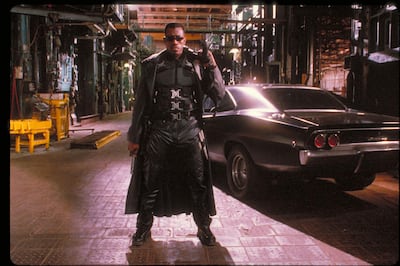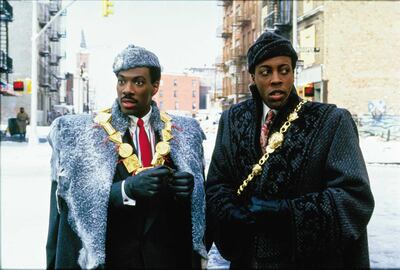So you are a mind-bogglingly successful comic publisher that has teamed up with movie giant Disney to produce the most successful franchise in cinema history. Your formula appears, like your superhero characters, invincible, as sequel after spin-off after reboot soars through the billion-dollar box-office mark. What do you do? Take the winning formula and press ahead in a "if it ain't broke, don't fix it" manner, delivering more of what audiences know and love? Or take the rule book, rip it up and create something that quite possibly has never been done before?
In the case of the Marvel Cinematic Universe, it is the latter option. The latest in the MCU franchise, Black Panther, delivers not only an overwhelmingly black cast, but a host of strong female characters – two guaranteed audience turn-offs by conventional Hollywood studio wisdom. Conventional Hollywood wisdom may be about to be turned on its head, however. The first reviews of the movie are out – and are almost universally positive, with a slew of early four- and five-star verdicts. Even before the first reviews landed, the movie was tracking for an opening weekend gross of about $150 million (Dh551m) – higher than every Harry Potter film – and that seems only likely to increase. The film is already the highest-selling first-quarter film ever on advance-ticket-sales site Fandango.
There have been plenty of critically and commercially successful films featuring black casts and/or leads, even though a University of Southern California study found that out of 30,000 characters in the 700 top-grossing films between 2007 and 2014, almost three-quarters were white. Black Panther is something a little different, however. If we look through the history of "black" successes at the box office, there are a few key themes that repeatedly occur, from the earliest days of Hollywood to the present.
Slavery features highly, with films such as Steve McQueen's Oscar-winner 12 Years a Slave (2013) and Nate Parker's The Birth of a Nation (2016) among recent movies tackling the subject. Early Hollywood wasn't exactly brimming with roles for black actors. Films such as D W Griffith's (unrelated) 1915 Birth of a Nation and 1927's Uncle Tom's Cabin featured white actors painted in "blackface".
______________
Read more:
Chadwick Boseman: why 'Black Panther' needed African accent
The stars coming to Middle East Film & Comic Con this year
Watch: Official trailer drops for Avengers: Infinity War
______________
When black characters aren't enslaved, the most plentiful roles were still in some form of servitude. One of the first films to feature a significant number of black characters played by black actors was 1939's Gone with the Wind, the epic adaptation of Margaret Mitchell's novel about slavery and the US civil war. In the film, those fortunate enough not to be toiling in the cotton plantations of Georgia were first and foremost the household slaves of the film's well-to-do white lead characters. Hattie McDaniel even won the very first black Oscar, for her supporting role in the movie as house servant Mammy, although she was unable to attend the film's premiere because it took place in a whites-only cinema.
In 1963, Sidney Poitier became the first black recipient of the Oscar for Best Actor for his role as Homer Smith, an itinerant handyman building a chapel for a group of German nuns. More recently, films such as Lee Daniels' The Butler and even 1980s TV sitcom Benson furthered the image of the black man as a reliable helper, with varying degrees of empowerment, while buddy movies such as Lethal Weapon and Men in Black advanced the notion of the black man as a loveable sidekick.
The kickback against the enslavement and racism suffered by African-Americans has understandably led to a wealth of films dealing with the civil-rights movement. Key figures such as Rosa Parks, Malcolm X and Martin Luther King have all received numerous cinematic treatments; a recent success in this category was Ava DuVernay's 2014 Selma, about the 1965 Selma March. Further afield, South Africa's anti-apartheid hero Nelson Mandela has also had his fair share of big screen attention, including Justin Chadwick's 2013 hit Mandela: Long Walk to Freedom.
Recently, there have been a number of stronger roles, particularly urban ones, for black actors in films such as 2015's multi-award winning Straight Outta Compton, 2016 Best Picture winner Moonlight and the prolific work of Spike Lee. What unites all these films, however, is the prevalence of guns, gangs and violence, a strand that can be followed back to the Blaxploitation movies of the 1970s. That genre, probably best exemplified by Gordon Parks' Shaft (1971), was the first to feature black actors in leading roles and a predominantly black cast. The prevalence of crime and, as the genre's name implies, exploitation in these movies could hardly be said to help towards offering a positive vision of its protagonists, however.

Finally, there are the big-star vehicles. These movies may not fit into the categories above – think Eddie Murphy in The Nutty Professor, Martin Lawrence in Big Momma's House, Will Smith in, well, seemingly everything or even Wesley Snipes as the first black Marvel big-screen superhero in 1998's Blade. These could all be termed mainstream films, without an overtly social or political agenda. The main characters could just as easily have been played by say Tom Cruise but the movies are really about their stars, not the roles they play. It seems that only when a name or a personality is big enough to pull crowds through the doors in their own right can a black actor be entrusted to lead a film without all the stereotypes.
Black Panther, however, is none of these things. Its titular star Chadwick Boseman is a relative unknown, and his performance is understated next to Michael B Jordan's villainous Killmonger. His character certainly couldn't be played by a white actor – Africa is in Black Panther's very blood. The movie makes plenty of commentary about civil rights, slavery and colonialism, but it is not defined by them. Black Panther's homeland of Wakanda is most definitely a black neighbourhood, but not the crime-riddled type in Boyz n the Hood et al. It is a veritable Utopia, complete with futuristic technology and a life of luxury for its residents, albeit under a heavily militarised absolute monarchy (but fair and just, naturally). Perhaps most importantly, Black Panther is a Marvel superhero – and certainly nobody's servant.

Perhaps the closest forebear is 1988 Eddie Murphy vehicle Coming to America – currently the highest-grossing "black" movie of all time. It does fit into the star-vehicle category, but there is no way that a white actor could have stepped into the role of an African prince roughing it in New York. Much of the humour, however, derives from how ill-equipped Murphy's Prince Akeem and his aide Semmi (Arsenio Hall) are to survive in the modern-day US – there is almost an inherent racism in the way that we laugh at Akeem's fish-out-of-water frolics. Conversely, Black Panther, or at least his day-to-day persona of King T'Challa, is perfectly equipped to survive and prosper in his own culture – a mix of the highly traditional and ultra-modern – and the western world, sitting somewhere between the two. As such, it is perhaps the most triumphant example of a "black film" seen to date.
And nobody laughs at The Black Panther.





